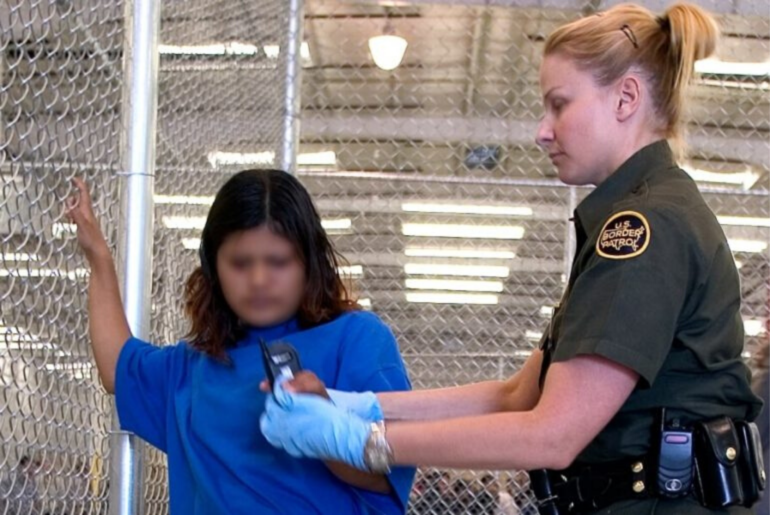A group of 20 medical providers arrived at the U.S. Border Patrol’s processing facility in Chula Vista, California this month, carrying coolers filled with 120 doses of the flu vaccine. When the Customs and Border Patrol (CBP) agency refused their offer to vaccinate as many people in the migrant detention center who consented, the physicians, nurses, and supporters demonstrated outside the nearby Border Patrol headquarters. Four doctors were among the six protestors arrested for blocking the building entrances.
The Department of Homeland Security’s press secretary dismissed their efforts in a tweet, saying: “Of course Border Patrol isn’t going to let a random group of radical political activists show up and start injecting people with drugs.” But members of Doctors for Camp Closure say that DHS and the Center for Border Protection are failing to protect migrants in crowded detention facilities from contracting potentially fatal diseases.
“After more than one year of inaction, we feel that it is important to show that we are serious and ready to provide flu vaccinations,” said Dr. Marie DeLuca, a New York emergency medicine physician, and co-founder of Doctors for Camp Closure, in remarks to the New York Times. The immigrant-health advocacy group of 2,000 medial professionals and students had contacted the CBP over a month ago with a vaccination proposal for detainees, said DeLuca. When they did not hear from the agency, the advocates decided to travel to Chula Vista in order to provide the free vaccines, which ended in a showdown with border officials.
The Center for Border Protection has faced scrutiny from lawmakers and the broader public over its refusal to vaccinate migrants in detention centers, despite express recommendations from the Centers for Disease Control and Prevention first reported by the Washington Post last month.
A Nov. 7 letter from CDC director, Robert Redfield, responding to inquiries from Rep. Rosa L. DeLauro (D-Conn.) — chair of the House Appropriations subcommittee that manages funding for the CDC and its parent agency, the Department of Health and Human Services — indicated discussions had been underway with the U.S. Customs and Border Protection since early 2018 about child deaths at detention centers. By January 2019, the CDC had sent written guidelines to the Department of Homeland Security, which oversees the CBP, and had communicated weekly with the CBP about flu incidents in their facilities. Meanwhile during the 2018 – 2019 flu season, three children at CBP centers died of the flu — with two deaths occurring after the CDC’s initial advice to vaccinate detainees.
“CDC’s recommendations are clear: flu vaccines should be administered to people as soon as possible to prevent the spread of this deadly disease,” said DeLauro. “Worse still, administration policies that kept families locked in cages for extended periods of time greatly increased their risk of illness.”
The CBP remains opposed to administering flu shots, saying that detainees are typically housed at their facilities for a maximum of 72 hours before they are transferred to long-term detention centers. The agency says it is against vaccinations, given this time constraint, and prefers to rely on their expansion of other medical care programs along the border to promote health among those detained.
“To try and layer a comprehensive vaccinations system onto that would be logistically very challenging for a number of reasons,” the agency said in a statement. “The system and process for implementing vaccines — including vaccine supply chains, quality control, documentation, informed consent — are already in place at other steps in the immigration process as appropriate.”
Advocates counter by pointing to the CBP’s violation of its 72 hour detention policy, especially when it comes to migrant children. Also, the Trump administration’s expanding “Remain in Mexico” policy would ensure that immigrants who arrive and seek asylum in the Tucson area, are routed to Cuidad Juarez, Mexico by way of El Paso. Once out of the CBP system, these individuals would not have access to healthcare measured implemented by the agency, which can further aggravate flu and other outbreaks among migrants. In addition, the CBP refuses the help of volunteer medical professionals, and groups like Doctors for Camp Closure, to provide flu vaccinations free of charge.
Without proper screening and treatment of influenza, outbreaks will continue to impact both migrants and Border Patrol population that enforces detention policies. For perspective, the three children who died while in custody at centers in El Paso and Weslaco, Texas, represent a much higher incidence of flu and flu-related deaths, than in the U.S. overall.
The U.S. rate of flu deaths among children is one in 600,000 children. By comparison, said a group of doctors affiliated with Harvard and John Hopkins, “this rate of death from influenza appears to be substantially less than the rate in detention facilities, with at least three deaths in as many as 200,000 children detained — many for less than the length of the season.”
The physicians have called on Congress to investigate health care programs at border facilities: “Poor conditions at the facilities may be amplifying the spread of influenza and other infectious diseases, increasing health risks to children. Moreover, we suspect that the Department of Homeland Security and Department of Health and Human Services may not be following best practices with respect to screening, treatment, isolation, and prevention of influenza.”







